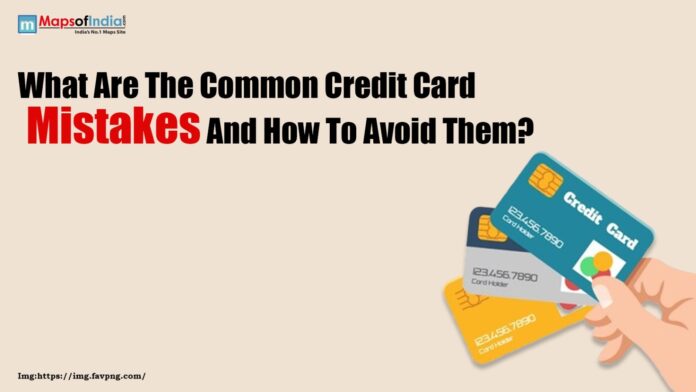Credit cards can be a good tool for managing finances, building credit, and even rewarding consumers with the potential of earning rewards. Poorly used, however, credit cards may result in debt, high-interest payments, and even a drop in one’s credit score. Many of these people do not realise the mistakes they commit with their credit cards, ultimately costing them a lot of money. Understanding and avoiding such common pitfalls will allow you to maximise the benefits of using credit cards without the drawbacks.
This article covers common credit card mistakes and practical tips about how to avoid them.
Common Credit Card Mistakes
-
Carrying a Balance and Paying Only the Minimum
One of the biggest mistakes you can make with a credit card is carrying a monthly balance and paying only the minimum. When you carry over your balance, interest quickly mounts on your outstanding balance, often at a relatively high rate. This means you will pay many times more than you initially paid for the purchase in the long run. Even though only the minimum may seem manageable to pay each month, it increases the amount owing through compound interest.
How to Avoid It: Pay your full monthly balance to avoid interest charges. If that is not possible, pay as much as possible over the minimum. Automatic payments help keep you on top of your bill and avoid missing a payment.
-
Turning Your Back on the Interest Rate and Terms
Credit card interest rates can vary; not all cards have equal terms. Failure to heed these details may cause undue charges and penalties. Most credit card users have no idea about the interest rate on their card, grace period, or penalty fees. Sometimes, surprise charges arise.
How to Avoid It: Read the terms and conditions before getting a credit card. Consider the interest rate (APR), grace period, and any fees associated with cash advances, late payments, or balance transfers. Knowing your card’s specifics will make you smarter and more judicious in your financial decisions, and you are less likely to incur surprising costs.
-
Missing Payments
Missing a payment can cause many complications, including late fees, an increase in your interest rate, and damage to your credit scores. Credit card companies often report this to all the credit bureaus involved, so it can affect your credibility when taking out future loans or any other financial opportunities.
How to Avoid It: Set reminders on your phone or calendar or use automatic payment to ensure timely payment. Most credit card providers offer the option to automatically pay for you either the minimum amount due or the full balance. Consistent payment will help maintain a good score and avoid late fees.
-
Over-spending Due to Credit Limits
Credit cards give you a false sense of freedom and liberty to spend up to your credit limit. Then, it ends up being a vicious cycle of overspending, which can go very high, making it nearly impossible to pay the debt and risk affecting your credit score. Consuming too much credit also means you have a high credit utilisation, suggesting to lenders that you may be a very high-risk borrower, which may hamper future credit approvals.
How to Avoid It:
- Establish a budget that includes your credit card’s spending limit.
- Monitor your expenditures regularly and control your spending before you exceed that limit.
- Keep your credit card usage below 30% of the total credit limit to maintain your good credit score.
-
Applying for multiple cards in a short period
Applying for several credit cards quickly will reduce your credit score. Every application entails a hard inquiry on the consumer report, which lasts for some time since it lowers the score. Furthermore, juggling between multiple cards increases the chance of failing to make a payment or exceeding one’s capacity to pay.
How to Avoid It:
- Apply for credit cards wisely.
- Only apply for the ones you need.
- Have a time gap between your applications so that there are no multiple hard inquiries within a short time window.
Having a few responsible credit cards may even benefit you more than having many cards that you only occasionally or less likely use.
-
Paying Cash Advances through Credit Cards
While cash advances are tempting as a source of quick access to cash, they carry incredibly high fees and interest rates. In contrast to standard purchases with regular credit cards, interest may start to collect immediately without a grace period for cash advances. Moreover, cash advance fees can add up quickly, increasing the total amount owed.
How to Avoid It: Use your credit card for cash advances only in emergencies. Instead, use alternatives like a short-term personal loan or savings to bridge immediate cash needs. Know your card’s cash advance policy and fee so you can make the right choice in emergency situations.
-
Failure to Leverage Rewards and Benefits
Most credit cards offer rewards in the form of cashback, points, or miles on certain types of purchases, but most card owners do not use them and thus fail to bank hundreds of dollars in rewards. Some cards also include extended warranties, purchase protection, or travel insurance that can come in handy if used correctly.
How to avoid it: Know the awards or points that your credit card offers. Know how to use your credit card wisely and earn as many rewards as possible from your expenditures, such as groceries, electricity, and travel. Be sure to pay off your expenditures in full at the end of the month so there is no interest charge. Get it redeemed frequently.
-
Not opening credit card statements
You are likely to miss your credit card statements, but if you don’t check them, you risk missing some vital information—where you have spent your money, which fees are charged, and even some possible fraud. Every transaction is reflected in your statement, so you risk missing errors or unauthorised charges if you don’t pay attention to it.
How to Avoid It: Read your credit card statement every month. Notice any unfamiliar charges or errors and immediately report them to your credit card issuer. Tracking your statements will also keep you abreast of your spending and spot areas for improvement.
-
Using Credit for Emergency Expenses
Many people use credit cards for such unexpected expenses, and thus, debt builds up. Using a credit card in emergencies is helpful if you do not have other options. However, relying on credit can become a source of financial pressure, especially when the debt is carried over month after month.
How to Avoid It: Build a reserve fund for emergencies. You don not need a lot of money, but having it can keep the desperation to use credit away for just when you need it most. Do small transfers from your paycheck for emergency savings until you can stash a little over time.
-
Closing Old Credit Card Accounts Early
Some consumers close old credit card accounts believing it will make their finances easier to track, but closing accounts lowers a consumer’s credit score. Closing accounts reduces one’s total available credit, increasing their credit utilisation ratio and, depending on when they opened the account, can shorten the length of their credit history, the key factor in determining their score.
How to Avoid It: If you plan on closing a credit card, do so thoughtfully. Try to keep old accounts open since the longer your history of credit, the better. To keep the credit card active even though you no longer use it, make small purchases you will pay off at the end of the month.
Using credit cards requires responsibility and discipline. You could use credit cards to avoid debt by understanding and staying away from common mistakes made with credit cards– carrying a balance, overspending, or missing payments. Being mindful of managing your credit-keeping statements regularly and even setting personal spending limits are habits leading to a healthier financial life. With such strategies, you can enjoy the benefits of using your credit cards, develop a good credit profile, and stay on a more favourable financial track.




